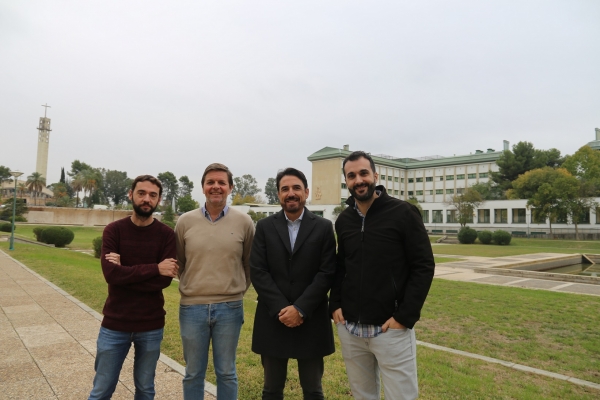Clean energy, based on renewable sources such as sunlight and wind, stands as the way forward towards a more inhabitable and sustainable world. A hurdle to this, however, is that renewables do not always produce energy when it is needed, and finding storage that is clean and with sufficient capacity is indispensable. Faced with the environmental impact of the extraction and recycling of the materials needed to build conventional batteries, which are often scarce, the research community is looking for alternatives.
Among these alternatives, an innovation has emerged, the result of a collaborative effort between the University of Cordoba's departments of Electrical and Automatic Engineering, Mechanics, and Physics. This device, developed by researchers Antonio Martín Alcántara, José Luis Aranda Hidalgo, Alberto Jiménez Solano and Antonio Sarsa Rubio, allows energy to be stored and released at the ideal time, using a cylindrical tank immersed in water. The system takes advantage of hydrostatic pressure (the weight of the liquid column on a surface) to compress air and subsequently expand it, in a turbine, delivering that stored energy.
The system, which could be submerged in a reservoir, for example, "consists of a cylindrical tube with a disc that divides it into two chambers: an upper one with water, and a lower one with air," explained Antonio Martín. "Initially (with the system loaded), the disc is up and the cylinder is full of air. Then that disc goes down and the water occupies the top of the cylinder, in turn compressing the air to a very high pressure due to the weight of the water," he continued. This is the energy release phase, since that compressed air comes out of a hole in the bottom of the cylinder and drives a turbine generating the energy.
To recharge the tube's storage a motor would be used, for example, to raise the disc so that the air would reoccupy the entire cylinder. "The device has been designed to store energy during periods of low prices and for recovery during peak ones," explained José Luis Aranda Hidalgo, who registered the invention inspired by this study as Utility Model (ES-1291145-Y)
The name given to the system is iOWC, as it revisits the existing Oscillating Water Column (OWC), but in reverse. This system, the OWC, is a simple mechanism used to extract energy from ocean waves through a cylinder in which the volume of water is below and its level rises with the ocean waves, thereby generating energy. This new inverted application, the iOWC, stands as an energy storage alternative.
At the Physics level, researchers Alberto Jiménez Solano and Antonio Sarsa Rubio have contributed to this theoretical feasibility analysis through conservation equations, which made it possible to define the practical dimensions necessary for the system's design and future implementation.
The results obtained by the team allow us to know how the system would respond, identifying the appropriate design conditions for its operation taking into account the aspect ratio (that between the width and height of the cylinder) and the size of the air outlet hole to achieve the necessary energy and power, reducing the oscillations that could occur in the cylinder's disc due to pressure. To mitigate these oscillations the researchers also propose a damping system.
With the development and theoretical formulation of this device's design progress is made towards a clean alternative for energy storage that would also make possible the charging and discharging of energy in response to market situations.
Reference
Martín-Alcántara, A., Aranda-Hidalgo, J. L., Jiménez-Solano, A., Sarsa-Rubio, A. (2023). Analysis and design of an inverted oscillating water column for energy storage under choked flow conditions. Energy, 285, 0360-5442. https://doi.org/10.1016/j.energy.2023.129356


